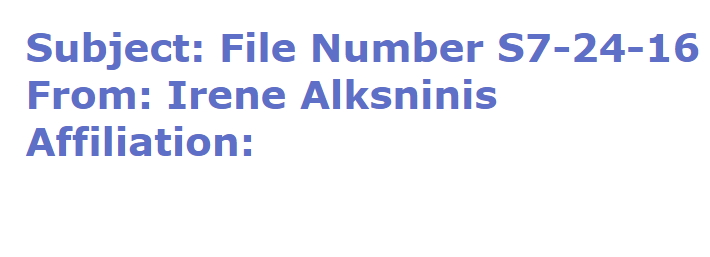SEC Chairman Jay Clayton claimed that the draft regulation on shareholders’ votes and proxy advisory firms received approval by hundreds of “Main Street” Americans. A Bloomberg investigation reveals that many of the letters that the SEC published on its website are fake. This reform could change American capitalism. We deserve more serious debate.

The purpose of public debate on a new regulation draft is to give scholars, consumers, investors, workers, and other stakeholders the possibility to comment and intervene. Vested interests, corruption, and political favor flourish thanks to discretion, confidential meetings, and classified documents. However, when the public debate is rigged, the whole credibility of the regulator vanishes.
More than one year ago, the Securities and Exchange Commission supposedly started a debate on a crucial new set of rules that will change the nature of American capitalism. The new regulation will make it harder for shareholders to have any proposal on the ballot that CEOs don’t like. Moreover, proxy advisory firms will face higher regulatory standards and legal risks if they advise their clients to vote against the company’s executives.
A Bloomberg investigation revealed that the first part of the public debate on this new regulation is rigged and used only to give fake legitimacy to a top-down decision.
On November 5, SEC chairman Jay Clayton announced the draft regulation, approved with a 3-2 vote by the SEC’s commissioners. These new limits to shareholders voting rights and proxy advisors had been demanded by “Main Street” Americans who asked the regulator to defend their savings, he said.

As a result of a roundtable in fall 2018, Clayton claims, “we received almost 300 unique comment letters and helpful suggestions to improve our proxy voting system. Some of the letters that struck me the most came from long-term Main Street investors, including an Army veteran and a Marine veteran, a police officer, a retired teacher, a public servant, a single Mom, a couple of retirees who saved for retirement, all of whom expressed concerns about the current proxy process.”
Textbook capitalism is based on informed investors who carefully choose the company they invest in and care about corporate governance decisions on executives’ pay, social externalities, and long term strategies. In real-world capitalism, the Bloomberg investigation reveals, regulators can justify their questionable proposals on the base of fake documents. According to Bloomberg, “a close look at the seven letters Clayton highlighted, and about two dozen others submitted to the SEC by supposedly regular people, shows they are the product of a misleading—and laughably clumsy—public relations campaign by corporate interests.”

Bloomberg reached out to the letters’ supposed authors: They had no idea what the journalists were talking about. The documents, posted on the SEC’s website, are clearly the product of a raw PR campaign: Bloomberg spotted that many letters bear the same usual errors, which provide “an inadvertent digital fingerprint revealing the scope of the campaign.”
The letters are so naive that it is difficult to believe that the SEC chairman could find them credible. How many single moms are actually worried that proxy advisory firms’ proposals to make corporations sensitive to climate change can negatively impact share prices? Apparently, Dawn Verachtert from Palatine, Illinois, is very sensitive to this problem: “I am asking that something be done to stop these firms from playing with my money and my boy’s future. Let the folks who work at proxy advisory firms bring about social change on their dime, not mine”, she supposedly wrote to the SEC.
For a country, having elections does not necessarily mean being a democracy. Posting some fake letters on the SEC official website is not like having a public debate, despite what SEC chairman Jay Clayton says.
There’s a 60 day window to submit comments to the SEC re: their proposal on regulating proxy advisors (which will make it harder for shareholders to vote against CEO preferences). Send @ProMarket_org your comments and they will publish the best ones here: https://t.co/nKDL8GZUlt
— Stigler Center (@StiglerCenter) November 19, 2019
However, there is still time to make this parody of a public debate a real opportunity to have a fair discussion on the proposed regulations on shareholders’ voting rights and proxy advisory firms’ power.
We invite ProMarket readers and contributors to benefit from the opportunity offered by the 60-day public comment period and send their opinions to the SEC.
Please send your comments to rule-comments@sec.gov and to our address as well, ProMarket@chicagobooth.edu. The three best proposals we receive will be published in this blog.
We are also offering these prizes: The first place winner will receive a free ticket to the Stigler Center’s flagship event, the 2020 Antitrust Conference in Chicago. The authors of the second and third best comments will receive a Capitalisn’t t-shirt.
The ProMarket blog is dedicated to discussing how competition tends to be subverted by special interests. The posts represent the opinions of their writers, not necessarily those of the University of Chicago, the Booth School of Business, or its faculty. For more information, please visit ProMarket Blog Policy.






